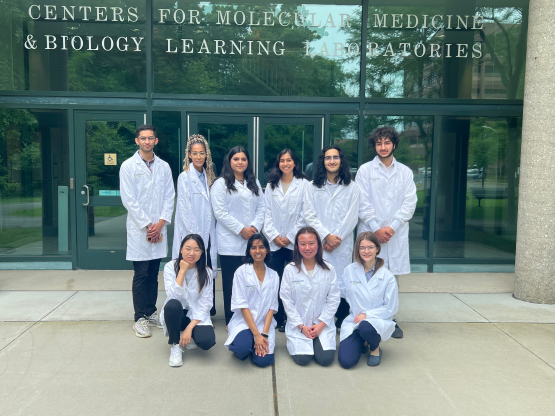
Eleven Stony Brook undergraduate students are representing the university at the 2022 iGEM Competition for synthetic biology in Paris, France this October.
iGEM (Internationally Genetically Engineered Machine) is a global competition that was started by the Massachusetts Institute of Technology (MIT) in 2003. In 2021, iGEM received submissions from 350 teams in 45 countries.
iGEM teams use synthetic biology, a multidisciplinary area of research that seeks to create new biological parts, devices and systems and design solutions for current problems.
This year’s Stony Brook iGEM team is utilizing synthetic biology to tackle the issue of protein S deficiency, a genetic disorder that affects blood clotting.
Protein S is a human protein found in the bloodstream that is important in regulating blood clotting cascades. The presence of protein S prevents abnormal blood clotting.
Patients with protein S deficiency are at an increased risk of developing deadly blood clots. In particular, protein S deficient individuals have higher chances of developing deep vein thrombosis (DVT), which is when a blood clot develops in the legs or arms. DVT can be deadly when these blood clots travel to the heart or lungs.
The team plans to place the DNA which codes for protein S into bacterial cells using recombinant DNA technology. After this process, the cells should be able to produce protein S naturally. The manufactured protein S can then be used as a therapeutic drug for patients who have protein S deficiency, and can also be used to treat traumatic brain injuries and even COVID-19.
The team has been studying the disorder since the 2022 spring semester in preparation for the competition. Lab work began in the summer and will continue throughout the fall.
Eva Paruch, a senior biochemistry and music major — as well as the 2022 iGEM team leader — explains that developing an alternative treatment for protein S deficiency is important. According to Paruch, current protein S deficient patients experience “many side effects caused by blood thinners such as heparin and warfarin, which constitute the traditional, current therapy for protein S deficiency.”
As part of the competition, iGEM teams have to incorporate multiple components into their project including outreach efforts, wet lab and dry lab work.
Wet lab involves traditional experimentation in which chemicals, biological materials and other components are tested and analyzed. In contrast, dry lab involves using computational analysis to model scientific systems. Through computational analysis, computers use pre-existing data to find patterns. The computer program can then produce a prediction of what may happen in specific scenarios based on those patterns.
As part of their wet lab procedures, the Stony Brook team is creating artificial protein S by inserting DNA into two types of cells: E. Coli and SF9. The team hopes that both cell types will accept the DNA and create a functional protein S.
Paruch notes that this is a “pretty complicated and ambitious project for undergraduates.”
In parallel to those performing wet lab, dry lab team members are attempting to predict the maximum amount of protein S that will be produced in both E. Coli and SF9 cells. Graphs of both predictions will be used to determine which type of cell is most optimal to use for future protein S production.
The team also aims to educate communities on the rare disorder through various outreach initiatives.
Protein S deficiency is “highly uncharacterized in African American communities, who actually experience a greater incidence of DVT than European populations,” Stephanie Laderwager, a senior biology major on the iGEM team, said.
In order to increase awareness about protein S deficiency, the team met with the Suffolk County Health commissioner, Dr. Greg Piggot, and the Director of the Office of Minority Health, Adessua Watson, to plan outreach events with local Indigenous and African American communities. At these events, the iGEM team plans to inform the greater Long Island population about the disorder.
Watson is helping the team set up events for communities of color in Long Island by connecting them to local NAACP organizations, the Unkechaug reservation and the Shinnecock Reservation. These events will encourage those with a family history of DVT to talk to healthcare providers about protein S deficiency.
This year’s project hits close to home for Laderwager. “My father and uncle both passed away from a pulmonary embolism which started as a DVT, so there was a blood clot in their leg that dislodged and went into their lungs,” she said.
The team’s outreach encourages people to talk to their healthcare providers about the deficiency in order to prevent similar occurrences. They are determined to make an impact beyond the lab.
According to Divleen Singh, a freshman biology major on iGEM, the team is able to function smoothly because of a diversity of talent. “Each team member has their own skill and knickknack, and so it’s really cool to see how everyone can chip in and make the project go further every week.”
Despite iGEM’s focus on synthetic biology, it is an opportunity for undergraduates to be exposed to and participate in the many aspects of research offered on campus. iGEM accepts applicants from all majors and academic standings, and requires involvement in dry lab, wet lab and outreach, appealing to students of all backgrounds.
Upon summarizing all the activities the team is participating in, Paurch reminded everyone to “keep [their] eyes open to young research teams!”











